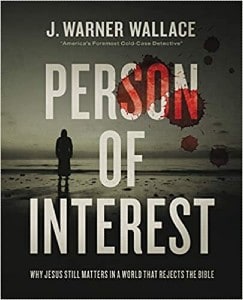Preview:
Warner Wallace: If Jesus is who you all think he is, are you really telling me that the only people who noticed this are four writers in the first century? I, wouldn’t you expect that if he’s the rock you think he is, when you throw him into the pond, there’d be some ripples, wouldn’t there?
John Fuller: That’s Detective J. Warner Wallace and he’s with us today asking some really penetrating questions. Thanks for joining us today for Focus on the Family, your host is Focus president and author, Jim Daly, and I’m John Fuller.
Jim Daly: John, we had a great conversation with Jim, J. Warner Wallace, who had some fascinating, uh, perspectives about Christianity and why beliefs matter. Uh, as he shared last time, Jim was a sarcastic skeptic who had no interest in the Bible, or God, or faith. I love talking to people like that …
John: Mm-hmm.
Jim: … who did come to faith, because it’s so … the foundation is so rock bottom hard, you know? They’ve gone through it. They denied it and then they were convinced.
John: Mm-hmm.
Jim: Always fascinating people to talk to, and if you missed it last time, get the download or come to the website and make sure you hear it, because I thought it was full of interesting insights.
John: Mm-hmm.
Jim: And he also described a unique investigative methodology as a homicide detective, uh, really concentrating on cold cases where there was no body. Think of the difficulty in prosecuting that kind of crime.
John: Hmm.
Jim: And he’s applied those concepts that he learned in that field to the existence of Christ, something he called fuse and fallout, which are the events that lead up to the catastrophic, uh, bomb, the ordeal that occurs, and then all the fallout that is around it. Again, very interesting concept, when you look at a guy from the first century and say, “We’re still talking about him today.”
John: Yeah.
Jim: That’s a pretty big, uh, fallout, right?
John: Mm-hmm.
Jim: That we still talk about Jesus and His meaning to history. Uh, Jim applies that methodology to Jesus’ life and, uh, man, I would just say get a copy.
John: Yeah, get a copy of the book, Person of Interest written by J. Warner Wallace and, uh, we do have those here at the ministry. Check the website, focusonthefamily.com/broadcast, or give us a call, 800, the letter A, and the word FAMILY.
Jim: Jim, welcome back.
J. Warner: Thanks for having me. I appreciate it.
Jim: It was so good. I, I just love this area, because there’s so many good thoughts that you can give to a non-believer to just make them think. Um, that was what I expressed last time, uh, you know, when I was in college and I came to this conclusion, “I better read the word of God.”
J. Warner: Right.
Jim: I’ve been reading these business books, I’m preparing myself vocationally, but this is the most important book to read.
J. Warner: Yeah, and I constantly will encounter people, and this is the skeptic in me, right? So I didn’t have any, uh, Christians in my life growing up, that if you asked, and I still see this, if you ask, uh, people, “Why are you a Christian?” The most popular answer I get is, “I was raised in the church.”
Jim: Mm-hmm.
J. Warner: Somebody, my parents were believers.
Jim: Hmm.
J. Warner: Somebody raised me in the church.
Jim: Interesting.
J. Warner: And that, that is the number one answer you’ll get. The second most popular answer is, uh, “Well, I’ve had an experience that demonstrated for me that Christianity was true. A prayer was answered. I had a certain, uh, experience after reading scripture.” Yet, we believe as Christians that those other experiences do not actually point to the truth.
Jim: Hm.
J. Warner: So what I wanna say is, look, we haven’t had that world view that’s grounded in the historical event. It’s not grounded in the wisdom teaching of a prophet, or the wisdom statements of an, an ancient sage. It’s, of course, Jesus makes these statements, but it’s grounded in the resurrection. If that didn’t occur, none of this is true.
Jim: Right.
J. Warner: And that means we can test this in a way that other religious world views cannot test their claims. This is grounded in history. We ought to be able to say yes, I was raised in the church, perhaps, or I’ve had an experience that demonstrates that… But I was able to test that experience against what I can examine and know is true evidentially. ‘Cause we’re in the one place where we could do that. And by the way, I’ve got grown kids. Um, and I have, one of my sons will tell you that there was a season in which he was kind of wandering. But because he knew and was raised this way that he knew it was evidentially true. There’s only so far, you’re gonna go.
Jim: Correct.
J. Warner: It’s kind of that rubber band theology. Right? If, if you go too far with the rubber band and let go, it snaps, it hurts a little bit. If you go even further, it hurts even more. So if you can help your kids not go-, stray too far.
Jim: Right.
J. Warner: Because they know it’s true and you can only do so much with what’s true, well, that’s where I think we can make a difference in our own kids.
Jim: Well and that, I love that very point. It’s evidence based, it’s history, there’s records both in the scripture, outside of the scripture who Jesus was.
J. Warner: That’s right.
Jim: And that kind of pulls us back. Uh, we have new viewers, new listeners today, Jim, so I wanna recap a little bit on this idea of fuse and fallout.
J. Warner: Mm-hmm.
Jim: It’s such powerful concept and for most of us who do not work as detectives…
J. Warner: Yea.
Jim: Uh, it’s helpful to hear how you apply what you learned in your vocation as a homicide detective to the truth claims of Christ. So give us that refresher on fuse and fallout.
J. Warner: Sure. If we’ve got a case where we’ve got no evidence in the crime scene, we have to make the case a different way. And I typically will tell jurors that we’ve got, every case occurs in a timeline. There’s time before the crime, and a time after the crime. And on the day of the crime, if there was a murder instead of, she just ran off, let’s say, or she just vanished, and she’s out there somewhere living her life, well, then that was an explosive day, and that bomb was preceded by a fuse of tension that was rising until something happens bad, and then after that bomb explodes, you’ve got fallout and shrapnel all over the blast radius.
J. Warner: Well look, if you didn’t have any information from the New Testament, if every New Testament, imagine this thought experiment where every New Testament had been successfully destroyed by some evil future regime, so I don’t have a single manuscript or a single Bible. They’ve all been destroyed. It turns out from just the fuse and fallout of history; you can reconstruct in its entirety the story of Jesus. You could be saved with the information you would just get from the fuse and fallout, so that even if every New Testament had been destroyed, this is the kind of impact that Jesus has.
J. Warner: There’s a reason why we call this the first century, even though…
Jim: Yeah, right.
J. Warner: Guess what? It’s not the first century? Okay? (laughs)
Jim: (laughs) Right.
J. Warner: There was a bunch of centuries before the first century, but we keep on calling it the first century because something explosive happened. And the, what the explosive thing is, if I didn’t know anything from scripture, I could reconstruct what that was just from the fuse and fallout of history.
John: Hm.
Jim: So in that fallout, uh, section, ’cause we covered a lot of the fuse last time. So in the fallout of the investigation, wha-, where can we see how Jesus transformed our world in those remarkable ways? What’s the evidence?
J. Warner: so I’m looking at two things. Number one is that does he have out-sized impact? Impact that makes sense only if he is who he said he was. In other words, he’s either a fiction, or he’s a regular old sage in the first century, or he is the God of the universe stepping back into his creation. So the question is, am I gonna see the kind of impact that makes sense of number three, that only, only can be explained if he is God stepping into his creation. So that’s what I wanted to know. So impact was number one.
J. Warner: But number two is, is his impact so dramatic and so unique that his story can be reconstructed from the impact? And I’m looking at those areas that were important to me as an atheist. Those are literature, art, music, education, and science. Those are the things…
Jim: Unbelievable.
J. Warner: … that I thought were the most important as an atheist.
Jim: Yeah. (laughs)
J. Warner: Now there’s a sixth category which is world religions. Every other theistic world view turns out Jesus has had so much impact on literature, art, music, education, science, and world religions, that his story could be reconstructed from those aspects of our culture, even if every New Testament was destroyed.
Jim: Hm.
J. Warner: And that makes no sense at all unless, of course, he is who he said he was.
Jim: Yeah. What about the skeptic that might say those were all manipulated things from an emerging European perspective?
J. Warner: Okay, so, that’s a great question.
Jim: You know that this was all forced on humanity by these people that were trying to shape and manipulate people.
J. Warner: Yeah, I, I was that skeptic.
Jim: Sure.
J. Warner: That would’ve been my claim. So for example, one of these claims is made about, you know, the over-sized impact of Christians, wha-, the Christian world view in the sciences. People don’t really understand that.
Jim: Right. (laughs)
J. Warner: But it turns out that the scientific revolution was dominantly Christian, and it’s happening in Europe under Christendom. Now…
Jim: And the-, let me just add, ’cause I’d like your response to this.
J. Warner: Mm-hmm.
Jim: That the basis there was they believed in God and therefore they could know the universe that God has created. That was kind of their premise.
J. Warner: Well, yeah. There’s, I think there’s several igniters there that’s coming’ out of that story.
Jim: Yeah.
J. Warner: But yeah, part of it was that number one, they believed in a singular, orderly, rational God.
Jim: Right.
J. Warner: That is distinct from his creation. If you’re in a pantheon of disorderly debaucherous gods that are constantly stealing your spouse and doing all kinds of drunken debauchery, why would you expect that the created order would be reasonable and rational?
Jim: Right.
J. Warner: But we believe in an orderly, rational God, that’s not actual in creation as part of it, but is distinct from the creation he creates. The point is, on planet earth, Europe is a small part. There are many more people who weren’t living in Europe than were.
Jim: Huh.
J. Warner: On planet earth, there were many more people who were not Christians than were. Why doesn’t, why don’t the sciences catalyze and take off in Asia? Or in North Africa? Or in India? Or in other places where cultures had the impact. It happens under Christendom in Europe because that Christian world view acts as a catalyst for what was originally called natural philosophy, and then became called science. And this is what you see.
J. Warner: As a matter of fact, I traced all of this. If you look at the scientists who founded their disciplines, these are called the science fathers, you know, the father of modern astronomy, the father is moderate art, the father of quantum mechanics, whatever it may be. More fathers of scientific disciplines are Christ followers than all other groups combined.
Jim: Huh.
J. Warner: As a matter of fact, if you just look at the, the science fathers who also wrote about Jesus, you know, the church fathers wrote about Jesus. You could reconstruct the story of Jesus from just the church fathers, but it turns out you can reconstruct more of the story of Jesus from the science fathers than you can from the church fathers.
Jim: Hm.
J. Warner: And I think people just don’t realize that it’s not just that he had huge impact, it’s that his story can be reconstructed from the history of science.
Jim: Yeah.
John: Wow.
Jim: I mean, it, again, the book is chock full of these observations which is why people need to get a copy.
John: Mm-hmm.
Jim: Uh, let me ask you this, um, you mentioned your father was a policeman and you went into the arts and architecture. How did those disciplines help you as you kind of swerved back into follow up behind your dad as a detective?
J. Warner: Well, I can tell ya the first several years working in law enforcement, well, when I was in, in the arts, Suzie and I were together probably about 10 years. And I remember working in a firm in Santa Monica and just telling Suzie, you know, I don’t see us here. I don’t see any other couples who are having families that are, you know, I had very conservative views about marriage and family even before I was a Christian, and I just didn’t see anyone like us there.
Jim: Huh.
J. Warner: So, I, my dad, you know, he’s, this is a noble profession, it’s a calling, and, before I even knew what a calling was, so I followed him into law enforcement. I was 27, and I can tell you that, um, for a long time I struggled. I felt like I needed a creative outlet. I had no creative outlet. You know, I started a police band of officers playing in bands.
Jim: (laughs)
J. Warner: (laughs) We played music for a while and then eventually, you know, ’cause I was involved in architecture, I was constantly getting asked to draw the murder scenes before I was even assigned to homicide.
Jim: Oh, interesting.
John: Hm.
J. Warner: So eventually, when I got to doing jury trials, I started to help the D.A. visualize this for jurors, which is why this fuse and fallout, that’s a visual model we’ll put on the screen.
Jim: Yeah.
J. Warner: For jurors to see how this works. That has always colored the way I look at these investigations.
Jim: Yeah.
J. Warner: So here, I wanted to look at the arts, ’cause it turns out that from the arts alone, every episode of the Gospels has been painted by an ancient or sculpted or etched or drawn by an ancient. So that, the story of Jesus can be completely reconstructed from just the most ancient forms of art.
Jim: Yeah.
J. Warner: So you’d have to destroy more than the New Testament to get rid of the story of Jesus. You’d have to destroy many, many buildings and surfaces in which that image has been imaged. Jesus is the most imaged character in all historical figures, and the reason why that is so, uh, if you look at him, he changes based on culture. If you’re Chinese, you’re drawing Jesus at Chinese, probably. You’re probably using an artistic language that is local to your, uh, your nation, to your region.
J. Warner: So if you look at, uh, say Buddha, as he’s imaged in China compared to India, compared to South America, he’s imaged pretty much the same.
Jim: Huh.
J. Warner: But if you look at Jesus, and how he’s imaged in those three locations…
Jim: It’s personal.
J. Warner: … his image is radically different, because he looks like the people group who sees him as their personal savior.
Jim: Fascinating.
J. Warner: And so that’s why I think he, he inspires so many artists.
Jim: You know that fallout effect, too, and you mention this and you’re touching on it, all the arts, but also architecture.
J. Warner: Oh, absolutely.
Jim: I mean, you, you touched on that.
J. Warner: Yeah.
Jim: With the churches and what has been built.
J. Warner: Well, you knew I was gonna have to do that.
Jim: Yeah, you gotta get to that.
J. Warner: You know I have an architectural background, so…
Jim: (laughs)
J. Warner: So yeah, it, what happens…
Jim: Well, talk about that.
J. Warner: Well.
Jim: I mean, again that fallout perspective, that Jesus never existed, or he was a myth.
J. Warner: Right.
Jim: Man, you’d have to, the, the ripple effect that you mentioned at the top of the show…
J. Warner: Yeah. Well, you can-, the thing about this. The arts needed a studio in which to develop and, and many Christians were artistically inspired. But if you think about how we first met and the adobe, or not adobe but mud, kind of constructed, uh, small, residential homes, uh, in the Middle East. Think about that. That was a dark, cool, it was cooler, ’cause, you know, it was a hot environment.
Jim: Yeah.
J. Warner: But they were dark, small environments. We, we had a desire, as a group, to reflect the nature of Jesus who is not described as the dark.
Jim: Right.
J. Warner: He’s described as the light. We also had a desire to think about our salvation and the heavenly aspirations we have as a people group, and it turns out those two aspirations to reflect the light of Jesus and the heavenly aspirations of the Gospel, impacted the way we started to change our environments, so look, the-, for example, dome architecture gets to be so dominant in Christian churches because we wanna look up and see the awesome heavens that have inspired us from the very beginning. And if you look at, say for example, St. Peter’s and Michelangelo’s great dome there, you’ll see that the engineering feat to create some of these spaces is pretty remarkable.
Jim: Yeah.
J. Warner: But then, we also needed to kind of make those walls lighter to allow light in, so the kind of gothic movement in which the structure of churches is forced outward to allow for glass walls to come on the inside membrane.
Jim: Hm.
J. Warner: Well, that ends up creating spaces that are ridiculously beautiful. But what is the effort here? What’s driving it? It’s not just, hey, we want cool buildings. What’s driving it is that we want to reflect a space that reflects the light, Jesus as the light, and our heavenly aspirations, it’s about the Savior and salvation that drives the shaping of these spaces. And that drives an entire movement in architecture, and it continues to do that.
Jim: Hum.
J. Warner: But again, what is interesting, of all the historical features, who else has inspired more movements in the arts, literature, music, uh, education, and science than Jesus? If you think there’s somebody else out there who has not only had the impact of inspiration but also whose story can be reconstructed from this inspiration, tell me who that is.
John: Yeah, the worldwide impact of Jesus, is, um, outsized. And you can learn more about, uh, what our guest is talking about today in his book, Person of Interest. The author is J. Warner Wallace and, uh, you can find his book, uh, at our website, focusonthefamily.com/broadcast, or give us a call, 800, the letter A, and the word FAMILY.
Jim: Uh, Jim, just to further that discussion on music. Let’s make sure we catch that. ‘Cause music is really interesting to me. Of course Bach talked about the beauty, the orderliness of it, how it reflects God. I’ve heard others talk about it’s a distinct attribute of human beings that this is the creative source, this is what gives evidence that we’re made in the image of God, that we’re able to create music and enjoy music.
J. Warner: Mm-hmm.
Jim: It’s a really interesting concept. Speak to Jesus’ impact on music a little bit deeper.
J. Warner: Well, yeah, you know, I think about that, that’s a good point, because we sing about the things we care about most deeply. We sing about what we worship.
Jim: And it moves people.
J. Warner: It does. And it turns out, from the very beginning, the Christian world view has been a singing world view.
Jim: Huh.
J. Warner: I mean, Jesus sings a, a hymn at the last supper. Right? That hymn is often thought to be one of the Psalms of David. It’s-, we’ve been singing the Psalms of David for thousands of years. Okay? Matter of fact, if all you had was the music sung in hymn form of the first 300 years of the common era, you could reconstruct the entire story of Jesus.
Jim: Huh.
J. Warner: From just the songs we sing about him.
Jim: Mm-hmm.
J. Warner: You’d have to destroy more than the New Testament. But also the history of early music in the common ear. And what’s interesting about that is that we, think about where else in the world is there a world view that puts singers on a stage every week singing in front of a live audience? That’s called the church.
Jim: (laughs) Right.
J. Warner: And we do this all the time. And so we have advanced the cause of music. So, you know, think about, we have the words of the hymns and the words of the Psalms, but wouldn’t you like to know what the chords they were playing were?
Jim: Hm.
J. Warner: Wouldn’t you like to hear what the melody was? Well, it turns out the reason why you can hear a melody today is because a Christian invented musical notation. There was no musical notation. Harmonies? We invented these. The major scales, and minor scales, most of the instruments you’re playing today were created for the purpose of advancing music in the church. And so you, we contributed not just to some great music, but also to the history of music making in a way that is really unparalleled. And this is because Christians wanted to sing. As a matter of fact, I did a search of all of the pop music, we have an entire Christian music industry of course.
Jim: Oh yeah.
J. Warner: But aside from the Christian music industry, there’s the pop industry and the secular music industry. So I did a search of all of the Rolling Stones data base, the IMDB, the Billboard Magazine, like who were the top 100 artists in the last 150 years. Well, it turns out there’s lists of these things. So I just took the entire list, I put ’em together. It’s about 160 artists, I’d say 150, 160 artists. And I wrote about this in the book. Well, I looked at their personal catalog. All but two of these secular artists have sung about Jesus of Nazareth.
Jim: Hm.
J. Warner: Not, not all, all but two. Now, the thing about that, this cannot be said of any other person who claimed deity or any other religious leader or any other historical figure. No one has sung about anyone as much as they have sung about Jesus, in the oddest, strangest places. Frank Zappa’s got a song I think called Jesus Things You’re a Jerk. I think that’s kind of a funny name.
Jim: (laughs)
J. Warner: It’s not a, a positive song. It’s a negative song.
Jim: Mm-hmm.
J. Warner: I mean, but the point is…
Jim: It’s a reference.
J. Warner: … that Jesus, yeah, he’s gonna either infuriate you, inspire you, move you in some way positively or negatively. You cannot get away from the influence of Jesus on music.
Jim: Hm.
J. Warner: And so it’s not just that, so I would say this, whatever you’re listening to, if it’s pop music, if it’s country music, if it’s hip hop, whatever it is, it’s built on certain structural forms that are utterly dependent on Christians to invent them over the years so that today you have those structural forms in place so you can listen to the kind of music that you like.
Jim: I think that’s, I guess.
J. Warner: Well, that’s because Christians probably invented it.
Jim: Yeah.
John: Mm-hmm.
Jim: Jim, when we look at all the great people in human history, kings, queens, conquerors, explorers, inventors, philosophers, you know, and everybody else, what is your conclusion about their impact on the world compared to the impact that Jesus had?
J. Warner: That’s what’s so remarkable about Jesus of Nazareth. It’s really hard to explain, ’cause you know we’re calling this the first century and why are we calling it the first century? Well you can, I just challenge you to look at every significant figure in history who lived in the first century and go from the far east as you can to as far west.
Jim: It’s hard to go beyond a couple.
J. Warner: Yeah, honestly. I, I made a list. I put ’em in the book, ’cause I think most of you will look at it and go, “I don’t know any of these people.”
Jim: Right.
J. Warner: Because they had no impact on history that this guy, this sage from this small part of the Roman Empire, this guy who really had, think about it.
Jim: Three years.
J. Warner: He, he lives in a small, he’s born in a nowhere town, raised in a nowhere town, only moves about 200 miles from start to finish, he only has three years to accomplish his mission, the people who are religious reject, the people who are powerful are hunting him. Uh, he, people who say they love him end up denying or betraying him in some way. He’s got no real established family of merit, no education you can think of that would really cause this, no kids to extend his legacy, no wife, no-, he doesn’t write a book, never leads a nation, never rules an army. This is the guy who then eventually is falsely accused, brutally mocked, humiliated, executed, and they had to borrow a grave to bury him. K, this is the guy?
Jim: Is that the story you would write of a great conqueror or a great king.
J. Warner: You would not, this is so upside down.
Jim: (laughs) Right.J. Warner: In terms of what your expectations would be for someone like this. But if you take all of the leaders and I, the-, just-, beyond the first century. Look at every historic powerful leader in history, ask yourself, who has impacted literature, art, music, education, science, and world religion so deeply that his story can be reconstructed from those aspects of human culture? I’ll wait. ‘Cause you’re not gonna find anyone. It’s Jesus of Nazareth.
Jim: Hm.
J. Warner: That to me is remarkably unexpected. But that’s what would be true if he is who he said he was.
Jim: Yeah. And, Jim, I mean, we’re coming’ in, maybe only a couple of questions left, and one I really wanted to cover, especially for the person who is watching or listening that may be where you were at when you were 35. The hard charging criminal, you know, investigator, all that. What was the tipping point? I mean, what opened your eyes to spiritual things versus the facts and nothing’ but the facts.
J. Warner: I always get asked that question. But see, here’s what I do. I, in my cases I’m working cumulative circumstantial cases. That doesn’t mean it’s bad evidence, circumstantial evidence is anything other than an eyewitness, is called indirect evidence, circumstantial evidence. So even DNA is circumstantial. Fingerprints are circumstantial evidence. So I’m looking at cumulative cases. In other words, 80 things point to this guy.
Jim: Yeah.
J. Warner: It’s this, the weight. It’s death by a thousand paper cuts. Right? It is really that that one thing doesn’t seem like much, but when you have 80 things pointing to this, so I get to a point, examining what’s in the New Testament, and then all of this impact outside the New Testament, where I finally said, okay, I, I trust that the New Testament is telling me something true about Jesus, but that does not make you a Christian. I mean, the devils believe something is true about Jesus, but you know, the demons believe this, but it doesn’t mean they are Christ followers.
Jim: Correct.
J. Warner: So I always say it this way. Um, that took me about nine months, and there was no aha tipping point moment there. But I did get to the point where I told Suzie, I said, “I think this is telling me something true about Jesus, but I don’t understand why God would have to die this way and come this way. Do you get that?” And she’s like, “I don’t get it either.” So okay. So here we are. We’ve already now vetted the New Testament and I; I was examining it to see what it said about Jesus. What changed for me was, when I started to read the New Testament to see what it said about me.
Jim: Huh.
J. Warner: That’s when you start to have the aha moments.
Jim: Right.
J. Warner: Because it’s reading through Romans. It’s reading through First Corinthians. There’s a spiritual man and there’s a natural man. Right? That the-, no one has ever, you know, really chases God. We all reject God. This is really what I realized that Paul was talking’ about me. That’s when you start having aha moments. So, if you will read, look, at some point I realized that that person he’s describing who’s in need of a savior, that describes me.
Jim: Yeah.
J. Warner: But because I’d already done the homework to know there was a savior, I was able to connect that dot pretty easily.
Jim: Yeah.
J. Warner: So what I would say is this. I wrote about this years ago. I used to work, um, homicides, and I also worked officer-involved shootings. And I had an officer-involved shooting one night where we come out and we interview the officer who got involved in a shooting. He stops a car for drunk driving. He gets the drunk driver out and the drunk driver actually ends up wanting to kill the officer because he’s on parole and he does not want the officer to discover he’s got a gun in his waistband. So as he gets this guy out of the car, he, the guy turns on the officer and is pointing the gun at the officer. He made a decision that night. He would rather kill the officer than go to jail.
Jim: Right.
J. Warner: The officer survived it, and he’s now, I’m interviewing him, and he tells me that that moment, he knew, I-, what am I gonna do? I mean, it was a millisecond. I jump, I could try to-, he just said, “You know what? I knew I was wearing my bullet-proof vest and I had seen that vest stop bullets in the range.” Because we shoot at them. (laughs) “And so I knew that it was gonna hurt but if I could just tense up my mus-, my muscles, I could take the first couple of rounds and get my gun out and return fire.” So he stood there, calmly, and eventually survived the shooting.
Jim: Right.
J. Warner: Now, I want you to think about that for a second. That’s pretty harrowing, okay?
Jim: Oh!
J. Warner: Pretty courageous. But the reason why he was able to stand calmly in a difficult situation was because he already knew evidentially that that vest could stop the bullets. And if you know something is true evidentially, when you’re in a tough spot you will end up defaulting like muscle memory to what you know I want evidentially true. And so I want my kids, as I raised them, I hope that they know that this is evidentially true. And you might have-, you’re gonna have a trage-, you’re gonna have a tough time and you’re gonna be tempted to say, “Where’s God in this?” But if you know that this world view can stop bullets, you will stand in the gunfight.
Jim: Mm-hmm.
J. Warner: And so I think we have to, uh, help our kids to understand that this is not just my wishful thinking, or one of many options that will make your life better.
Jim: Yeah.
J. Warner: But this is actually true.
Jim: Yeah.
J. Warner: And it will stop bullets.
Jim: Yeah, and I think that’s one of the reasons that I was so excited to talk to you, and again it paralleled my experience in my 20s, just, uh, getting the head knowledge and the confidence that this was real, and then all the evidence that you’ve outlined, uh, that I didn’t have at the time. I wish I had your book. But, um, you know, it just, it helps open your heart to the reality of God.
J. Warner: Yeah.
Jim: And that combination needs to happen. You can’t just believe with your heart. Your head has to be involved.
J. Warner: It’s a both, and, for sure.
Jim: Right.
J. Warner: So I’m not against the experience, I just want the experience to be tested.
Jim: Yeah. Right. And I just think that’s the most powerful. I think of Paul that way. He was a brilliant man. It’s kind of funny when he went to Mars Hill and they said, “Who is this babbler?” (laughs) I’m thinking’, man, he’s one of the best communicators I’ve ever seen. (laughs)
J. Warner: I know. I know. But isn’t it interesting…?
Jim: But they referred to him as a babbler.
J. Warner: Yes, but he was willing to engage people on Mars Hill.
Jim: Right.
J. Warner: This is what we have to be-, realize that, look, ever notice that sometimes if in a dog yard the most yappy dog is the Chihuahua?
Jim: (laughs)
J. Warner: The quietest dog is the Great Dane.
John: Mm-hmm.
J. Warner: Well, we happen to have the Great Dane of world views, but we often end up sounding like Chihuahuas because we don’t know how strong our world view is.
Jim: (laughs) Well, that’s…
J. Warner: Well now I’m gonna get a lot of-, a lot of people are gonna be mad about Chihuahuas.
Jim: Yeah, no, no, it’s well said. We totally understand the point. Jim, this has been terrific. And I just hope, and I’m gonna take a couple of copies home for my boys, ’cause I want them to read it. Uh, Person of Interest, Why Jesus Still Matters in the World that Rejects the Bible. Get a copy. I mean, it-, this will equip you talk with people, too. It will give you lots of information about the reality of Jesus. And, uh, I can’t think of a, a better source outside of scripture itself to support the truth claims of Christ and the impact through, uh, the fuse and fallout analogy that you can share with other people. So get a copy, uh, support us, if you can monthly that’s great, or a one-time gift, and we’ll send you the book as our way of saying thank you for joining us in ministry, and, uh, boy, I, I just (laughs) don’t know how else to say get it.
John: Mm-hmm. Donate as you can today but calling 800, the letter A, and the word FAMILY. 800-232-6459, or stop by focusonthefamily.com/broadcast.
Jim: Jim, again, thanks for being with us. I’m excited to meet ya and to talk with you. Let’s keep that relationship going.
J. Warner: Thanks so much for having me. I can tell you; this has been such a blessing to me.
John: Well, we’re glad that you joined us as well to listen along here for Focus on the Family. And coming up tomorrow, what is your Ultimate Goal as a Parent?
Preview:
Chap Bettis: Third John 4, John says, “I have no greater joy than to hear that my children are walking in the truth.” And so to me, it’s what is the first priority? What is the north star that I’m aiming at?
End of Preview




















